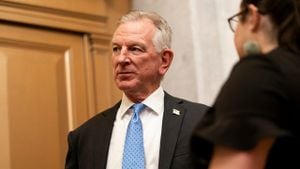Since taking office, President Donald Trump has made significant waves across various sectors, and the automotive industry is no exception. His policies and administration decisions have influenced everything from manufacturing locations to electric vehicle (EV) development. Amidst these shifts, Trump's relationship with automotive leaders like Ford has evolved, creating scenarios of cooperation and contention.
One of the most notable impacts of Trump's presidency is seen through his vocal support for American manufacturing. He has repeatedly emphasized the importance of keeping jobs domestic, often criticizing manufacturers who choose to move production overseas. This rhetoric is not just talk; it has real stakes, as firms like Ford and General Motors (GM) navigate complicated trade relations influenced by tariffs and trade agreements the Trump administration enacted.
Recently, Trump pledged to support the automotive sector by promoting incentives for buying American-made vehicles. Yet, this promise came at a time when electric vehicles were starting to gain traction, and many automakers were investing heavily. Tesla, for example, has surged as one of the leading brands not just for EVs, but also as a status symbol, drawing attention from younger consumers especially interested in eco-friendly options.
But with this growth has come complications. Many experts and industry insiders are wary of the potential collapse of certain incentives, particularly the federal tax credit for electric vehicles. Reports indicate Trump may seek to abolish or alter these credits, which could hinder consumer interest in EV purchases. Since these credits have been instrumental for many buyers, their removal could undercut efforts to boost electric vehicle sales, which automakers view as pivotal to future growth.
While the discussion has often centered on tax credits and tariffs, the broader narrative includes environmental concerns and consumer demand. Trump’s administration has rolled back numerous environmental regulations aimed at reducing emissions. Critics argue these moves threaten to stall progress on cleaner air and sustainable practices. Meanwhile, automakers find themselves caught between profit margins and expectations for greener production. This dilemma is illustrated by significant investments companies are making to pivot toward electric and hybrid vehicles, incorporating more sustainable practices amid fluctuated government policies.
The automotive industry is aware of the deep public interest surrounding electric vehicles, especially among younger generations. With eco-consciousness on the rise, companies like Ford and GM have established ambitious plans to significantly increase their electric vehicle offerings. Just this year, Ford unveiled plans to not only expand their EV lineup but also expedite the rollout to meet consumer demands—a strategy likely influenced by market trends as much as political climate.
Interestingly, Trump's shifting views on EVs have led to contradictions. While his administration initially embraced manufacturing advancements, reports have surfaced showing reluctance to endorse comprehensive EV policies. Critics argue this inconsistency creates uncertainty for investors and consumers alike, potentially stunting growth at a time when the market shows undeniable appetite for electric vehicles.
Trump's attention to the automotive sector is also evident through his public engagements. He has attended events like the Detroit Auto Show, where he has championed car manufacturers and reiterated his support for domestic production. This kind of visibility resonates well with his base, reaffirming his position as the champion of American labor, but it also suggests the automotive industry is becoming ever more entwined with political branding.
It's not just about immediate policies but the long-term vision for automotive manufacturers. Trump’s presidency has sparked debates about the future of automation, labor, and what it means to build the next generation of vehicles. Key players now face the task of adapting to patent changes, implementing new technologies, and rebranding their reputations away from the stigma associated with their earlier positions—the switch from fossil-fueled vehicles to hybrid and electric is no simple task.
Looking ahead, the automotive industry will continue to deal with both the ramifications of Trump's decisions and the long-term goals set forth by changes within the industry for sustainable practices. Automakers are wrestling with several questions: how to stay aligned with consumer trends, how to manage costs amid fluctuated incentives, and how to remain competitive with global players who are not constrained by the same policies.
All eyes are on the auto industry's response to potential changes to the federal EV tax credit. If Trump proceeds with these cuts, will it force manufacturers to rethink their strategies? Will consumers be deterred from pursuing electric vehicles? The coming months will undoubtedly reveal the shifting dynamics between the Trump administration and the automotive sector, with significant effects anticipated on manufacturing, consumer choices, and environmental impacts.
Automakers are also recognizing the importance of exploring international markets more aggressively. With China and Europe leading the charge on EV innovation and sustainability, U.S. manufacturers are confronted with the reality of global competition. Trump's trade policies have emphasized partnerships with neighboring countries, creating negotiation opportunities perhaps overlooked before.
The broader narrative here circles back to one central theme: adaptability. The automotive sector must navigate the unpredictable waters of political decision-making and consumer expectations, often dictated by the fluctuated environmental stances associated with governmental leadership. For President Trump, the automotive industry remains both a stronghold of his policy promises and, at times, roadblocks to his administration's vision of economic revival and growth.
At the heart of all these changes lie thousands of jobs and the capacity for innovation. The automotive industry has historically been resilient, and as it gears up to meet any new challenges presented, it seems poised to tackle the 21st century with new technologies and approaches. Moving forward, manufacturers will need to create solid strategies to remain viable players not just on the U.S. front but internationally. It’s this dance between political influence, market trends, and environmental needs, which will define the next chapter for American automotive manufacturing.



